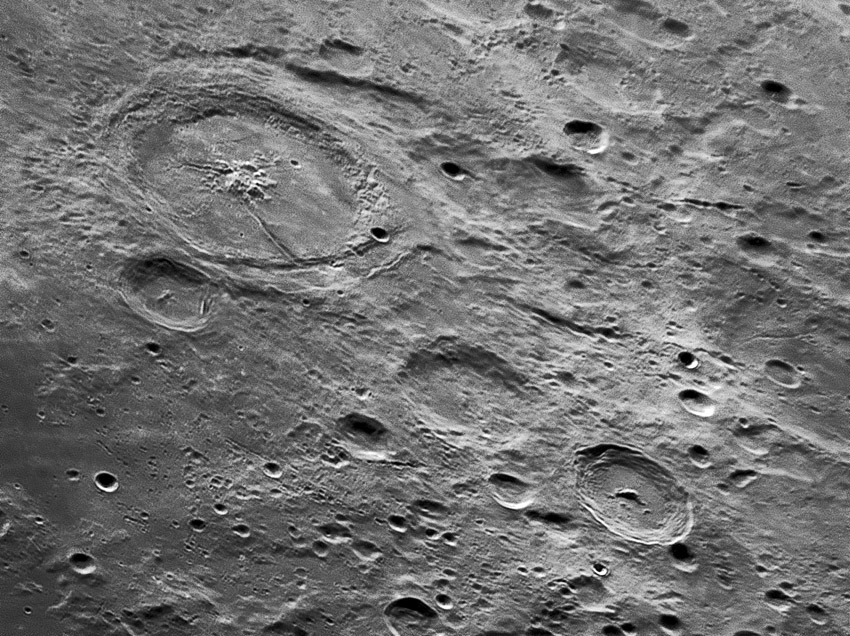Difference between revisions of "February 3, 2013"
| (One intermediate revision by the same user not shown) | |||
| Line 6: | Line 6: | ||
<em>north to left image by [mailto:reeves10@satx.rr.com Robert Reeves], San Antonio, Texas</em><br /> | <em>north to left image by [mailto:reeves10@satx.rr.com Robert Reeves], San Antonio, Texas</em><br /> | ||
<br /> | <br /> | ||
| − | While looking through videos captured six months ago Robert processed this one and discovered things he hadn't seen before. I have that experience all the time too. Here, Robert noticed three sets of crater chains/gouges on the right side of this image. These aren't quite radial, and not tangential, to Petavius, but presumably they came from there (or possible Langrenus?); as Robert said they might be a miniature version of Imbrium Sculpture. Look around and notice other smaller crater chains from other, unidentified sources. Staying on the right side of the image there are three other linears to detect. First is the rille on the floor of Furnerius at the center of the right edge. Next is the ghostly and thin Hase Rille which cuts diagonally from Petavius' rim to the top-right. Hase crosses the broader Snellius Valley basin crater chain. Snellius is the degraded crater near bottom right just above the younger Stevinus. Ejecta from Stevinus fills half of Snellius' floor. In the opposite direction a dark surface extends from of Stevinus - what is it? Above and below Stevnus are the recently [http://lpod. | + | While looking through videos captured six months ago Robert processed this one and discovered things he hadn't seen before. I have that experience all the time too. Here, Robert noticed three sets of crater chains/gouges on the right side of this image. These aren't quite radial, and not tangential, to Petavius, but presumably they came from there (or possible Langrenus?); as Robert said they might be a miniature version of Imbrium Sculpture. Look around and notice other smaller crater chains from other, unidentified sources. Staying on the right side of the image there are three other linears to detect. First is the rille on the floor of Furnerius at the center of the right edge. Next is the ghostly and thin Hase Rille which cuts diagonally from Petavius' rim to the top-right. Hase crosses the broader Snellius Valley basin crater chain. Snellius is the degraded crater near bottom right just above the younger Stevinus. Ejecta from Stevinus fills half of Snellius' floor. In the opposite direction a dark surface extends from of Stevinus - what is it? Above and below Stevnus are the recently [http://www2.lpod.org/wiki/January_31,_2013 seen] Headlights, crisply defined but dimmed. Just impinging on the rim of Petavius is the odd named Wrottesley. A straight bright bar inside the right rim is so conspicuous that it looks like a defect. But LRO QuickMap [http://target.lroc.asu.edu/da/qmap.html?mv=eqc&mcx=1716152.74402&mcy=-748490.08197&mz=8 shows] it just to be a terrace that seems to have slid down from its original position, and in Robert's image, perfectly catches the illumination.<br /> |
<br /> | <br /> | ||
<em>[mailto:tychocrater@yahoo.com Chuck Wood]</em><br /> | <em>[mailto:tychocrater@yahoo.com Chuck Wood]</em><br /> | ||
| Line 14: | Line 14: | ||
<br /> | <br /> | ||
<strong>Related Links</strong><br /> | <strong>Related Links</strong><br /> | ||
| − | Rükl plate [https://the-moon.us/wiki/R%C3% | + | Rükl plate [https://the-moon.us/wiki/R%C3%BCkl_69 69]<br /> |
| − | <em>[ | + | <em>[[21st Century Atlas of the Moon|21st Century Atlas]]</em> chart 4.<br /> |
Robert's [http://www.robertreeves.com website] (Thx, Patricio!)<br /> | Robert's [http://www.robertreeves.com website] (Thx, Patricio!)<br /> | ||
<br /> | <br /> | ||
Latest revision as of 08:27, 28 October 2018
Revisiting Familiar Ground

north to left image by Robert Reeves, San Antonio, Texas
While looking through videos captured six months ago Robert processed this one and discovered things he hadn't seen before. I have that experience all the time too. Here, Robert noticed three sets of crater chains/gouges on the right side of this image. These aren't quite radial, and not tangential, to Petavius, but presumably they came from there (or possible Langrenus?); as Robert said they might be a miniature version of Imbrium Sculpture. Look around and notice other smaller crater chains from other, unidentified sources. Staying on the right side of the image there are three other linears to detect. First is the rille on the floor of Furnerius at the center of the right edge. Next is the ghostly and thin Hase Rille which cuts diagonally from Petavius' rim to the top-right. Hase crosses the broader Snellius Valley basin crater chain. Snellius is the degraded crater near bottom right just above the younger Stevinus. Ejecta from Stevinus fills half of Snellius' floor. In the opposite direction a dark surface extends from of Stevinus - what is it? Above and below Stevnus are the recently seen Headlights, crisply defined but dimmed. Just impinging on the rim of Petavius is the odd named Wrottesley. A straight bright bar inside the right rim is so conspicuous that it looks like a defect. But LRO QuickMap shows it just to be a terrace that seems to have slid down from its original position, and in Robert's image, perfectly catches the illumination.
Chuck Wood
Technical Details
Sometime last summer through a classic orange tube Celestron-8 (38 years old!), 2.5X Powermate, DMK-51 monochrome camera with an IR filter. Processing was through Autostakkert, RegiStax 6, and Photoshop CS2, best 200 of 800 frames.
Related Links
Rükl plate 69
21st Century Atlas chart 4.
Robert's website (Thx, Patricio!)
Yesterday's LPOD: Inites
Tomorrow's LPOD: Where We Have Been
COMMENTS?
Register, Log in, and join in the comments.



